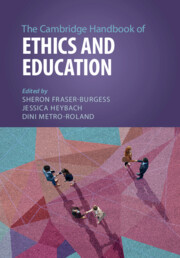Book contents
- The Cambridge Handbook of Ethics and Education
- The Cambridge Handbook of Ethics and Education
- Copyright page
- Epigraph
- Contents
- Figures
- Tables
- Contributors
- Foreword
- Preface
- Acknowledgments
- Part I Traditions in Ethics and Education
- Part II Ethics and Education in Practice
- 15 Why Educate?
- 16 The Displacement of Ethics in Education through Educational Standardization
- 17 School Health Policies and Practices
- 18 Value Creation and Happiness in Education
- 19 Children’s Rights, Childhood, and the Sovereignty of the Good
- 20 School Discipline and the Ethics of Punishment
- 21 Educating All Children
- 22 Decolonizing Curricula
- 23 The Political Necessity and Perilous Ambiguity of “Academic Freedom”
- 24 Teacher Activism and Ethical Speech
- 25 The Specter of Agreement
- 26 Philosophical Reflections on Ethics in Teaching and Teacher Education
- 27 The Ethical Dimension of Educating Educators
- Part III Emerging Ethical Pathways and Frameworks
- Index
- References
27 - The Ethical Dimension of Educating Educators
Cruel Optimism, Professional Development, and the Need for New Ethical Attachments
from Part II - Ethics and Education in Practice
Published online by Cambridge University Press: 07 March 2024
- The Cambridge Handbook of Ethics and Education
- The Cambridge Handbook of Ethics and Education
- Copyright page
- Epigraph
- Contents
- Figures
- Tables
- Contributors
- Foreword
- Preface
- Acknowledgments
- Part I Traditions in Ethics and Education
- Part II Ethics and Education in Practice
- 15 Why Educate?
- 16 The Displacement of Ethics in Education through Educational Standardization
- 17 School Health Policies and Practices
- 18 Value Creation and Happiness in Education
- 19 Children’s Rights, Childhood, and the Sovereignty of the Good
- 20 School Discipline and the Ethics of Punishment
- 21 Educating All Children
- 22 Decolonizing Curricula
- 23 The Political Necessity and Perilous Ambiguity of “Academic Freedom”
- 24 Teacher Activism and Ethical Speech
- 25 The Specter of Agreement
- 26 Philosophical Reflections on Ethics in Teaching and Teacher Education
- 27 The Ethical Dimension of Educating Educators
- Part III Emerging Ethical Pathways and Frameworks
- Index
- References
Summary
This chapter takes up the ethics of how educators are educated with special attention to in-service teachers who spend a career being “developed.” First, the authors clarify how the ends and means of professional development are wrapped up in dreams of the “good life” in a marketplace that replicates and sells cruel optimisms to educators and school leaders. Next, they situate the historical realities that led to the proliferation of professional development crisis narratives in education since the National Defense Education Act of 1958 and the Elementary and Secondary Education Act of 1965. Then, they critically discern what happens when educators’ attachments interact with crisis narratives through a neoliberal, for-profit professional development (PD) industry. Finally, the authors outline a path forward for educators to recognize the crisis narratives of PD as attachments, to resist such a PD industry by theorizing an anarchic professional development for educators emerging from what Berlant calls the “impasse” – PD that is local, situational, and supportive of teachers’ learning. The chapter concludes by arguing that educators should work collaboratively, intellectualize teaching, focus on classroom inquiry, foster networks of practice, and reclaim the moral dimension of their practice.
- Type
- Chapter
- Information
- The Cambridge Handbook of Ethics and Education , pp. 571 - 592Publisher: Cambridge University PressPrint publication year: 2024

